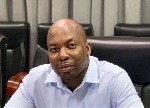John Kumah writes: Ghana’s future secured with NPP and Bawumia
 John Kumah
John Kumah
Not long ago, the Vice President and the presidential candidate of the great New Patriotic Party (NPP) outlined his vision for Ghana should Ghanaians elect him President in 2025. The carefully thought-through speech will go down in the annals of Ghana’s politics as one of the most comprehensive, coherent, cogent, targeted, solution-oriented, and very promising speech. Not only did Dr Bawumia give Ghanaians a flavour of a Ghana we aspire to, but he concretely demonstrated that it was achievable despite the name-calling by naysayers. The sprouting of uniquely identified ideas, the clearly thought-through solutions, and his mindedness and foreboding of tomorrow clearly show that, indeed, Dr Bawumia derives his greatest joy from solving problems. Kudos, Mr. Vice President.
Now, I will delve into a few of the things Dr. Bawumia spoke about at the lecture and try to provide my perspective on them. The first on my list is the impact digitalisation could have on domestic revenue mobilisation. It is undeniable that domestic revenue mobilisation efforts have, over the years, undergone several reforms. Many of the tax reforms have looked at enhancing tax administration and compliance. The creation of the Ghana Revenue Authority (GRA) was one such reform that helped address fragmentation in tax administration in Ghana. The revenue assurance and compliance enforcement (RACE) initiative was another reform instituted to help close loopholes in the tax system and move tax revenue to GDP to the Sub-Saharan average of 18 percent in the short to medium term.
Ghana’s current tax revenue to GDP is circa 13 percent, way below the sub-regional average. It needs no saying that tax administration faces many challenges. There are many informal sector activities which currently are done outside the tax bracket. There are many businesses conducted via new media, and many do not pay taxes. The GRA has, over the years, initiated a raft of measures to broaden the tax network, but the result has been nothing short of success. The Bawumia tax reform hinged on digitalisation and is truly aimed at addressing the imbalances in tax administration where a few pay taxes and many free rides because there is no system to trace and track them. A fully digital tax office will increase the tax bracket, it will be fair, the tax burden will be bearable by all, and evasion will be reduced. The free-rider problem will be addressed with this initiative.
Next on my list relates to Dr. Bawumia’s vision for education in Ghana and how the digital evolution will help improve the quality of education in Ghana. Ultimately, Bawumia’s plan is to ensure that every Ghanaian student is equipped with the skills that will make him/her savvier and more competitive than any other student from any part of the world. Already, the digital revolution has started with the expansion of access to free Wi-Fi and laptops in many schools in Ghana. The free SHS policy will be sustained to ensure each Ghanaian has access to at least a secondary education. Enhancing focus on TVET education will enhance the training of skilled workforce for the Ghanaian job market while taking advantage of the African market under the African Continental Free Trade Area.
The repositioning of the education system towards STEM, Robotics, Artificial intelligence, and vocational skills will not only help Ghana meet the 4th Industrial Revolution but also become relevant in the increasingly competitive job market. The Bawumia education plan will seek to improve every stakeholder (students, teachers, and education administrators) in the education strata. Infrastructure at every level will be enhanced and positioned to be the springboard for producing Ghanaian future captains in every facet of society. Dr. Bawumia’s idea of ensuring we build consensus on education will eliminate the ad hoc approach to education policymaking in Ghana. Under Dr Bawumia, every Ghanaian will experience the digital revolution, and every Ghanaian student will have the requisite tools to be able to compete and participate in the fast-changing technological world. Any Ghanaian child will have the skill set required to compete for any job, anywhere in the world. The connectedness of the world makes it possible to live in Ghana and work remotely in any part of the world. Bawumia will bring back the Ghanaian dominance in education.
Another view of Dr Bawumia that resonates with me is his call on all of us Ghanaians to rebuild our soft power and re-orient our faculty to one of possibilities. Ghanaians have endured many adversities (political and economic) in the past. In many of such difficult times, we have prevailed because of our strong mindset of possibilities. Our belief in ourselves as a people, and our determination to do good for ourselves have always driven us to fight on, even when our strength is depleted. We never give up until the work is done. The need to uphold our soft power has never been clarion than now. The idea of introducing a growth mindset curriculum to help students build critical skills such as problem-solving, risk-taking, opportunity spotting and design thinking is long overdue.
Dr. Bawumia’s power sector reform agenda is quite interesting, especially for those concerned about climate change. The plan is to shift the power generation motley from fossil fuel sources to renewables such as wind and solar. The energy sector has been a big drain on the economy, especially from the power purchase agreements of the independent power producers. The sustainability of many of the ‘take or pay’ IPPs is in doubt, and there is a need to find cheaper, efficient, and reliable alternatives. The vision of Dr Bawumia to diversify the power production mix by introducing 2,000MW of solar and wind power by the end of his first term is encouraging and will be a big saving on the public purse. It will equally bring relief to electricity users through a reduction in electricity cost. The view of making Ghana an electricity production hub is commendable, and its added advantages, including improvement in services, job creation, and forex earnings from electricity export, will positively impact the economy.
There are a gamut of issues Dr. Bawumia discussed, including the introduction of the golden age for the maximization of benefits from natural resources, using AI to transform agriculture, a digital approach to fighting corruption, measures to support the cedi, policy of industrialisation for jobs, and the development of a credit system are some of the novel ideas that must be supported. Quite clearly, Dr. Bawumia has the magic wand to build on what President Akufo Addo has done over the past 7-years. This government has set the base for Dr. Bawumia to move Ghana into the next chapter of Ghana’s development, where IT IS POSSIBLE for every Ghanaian to live their dreams and where impossibilities become possible.
Source: Classfmonline.com





